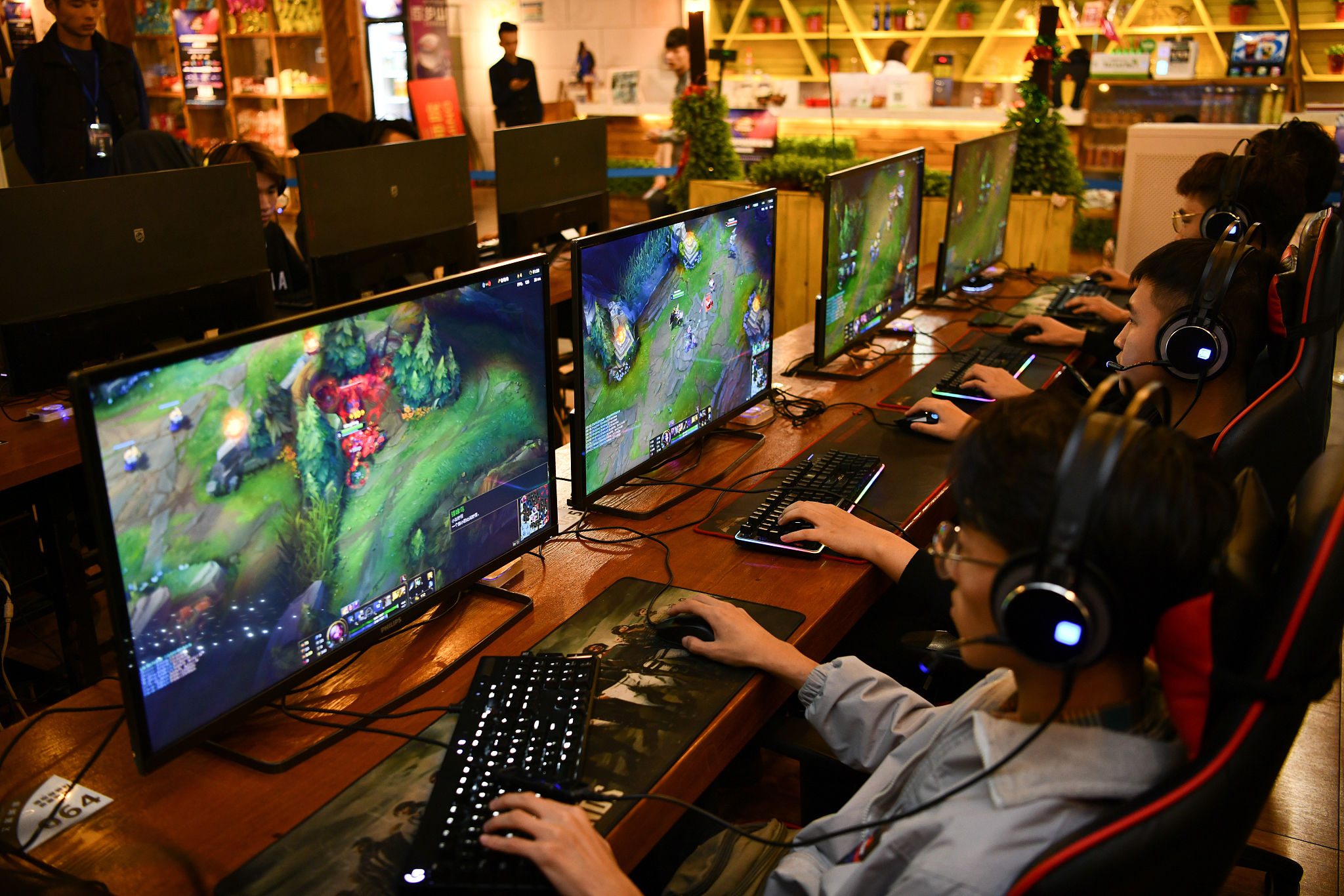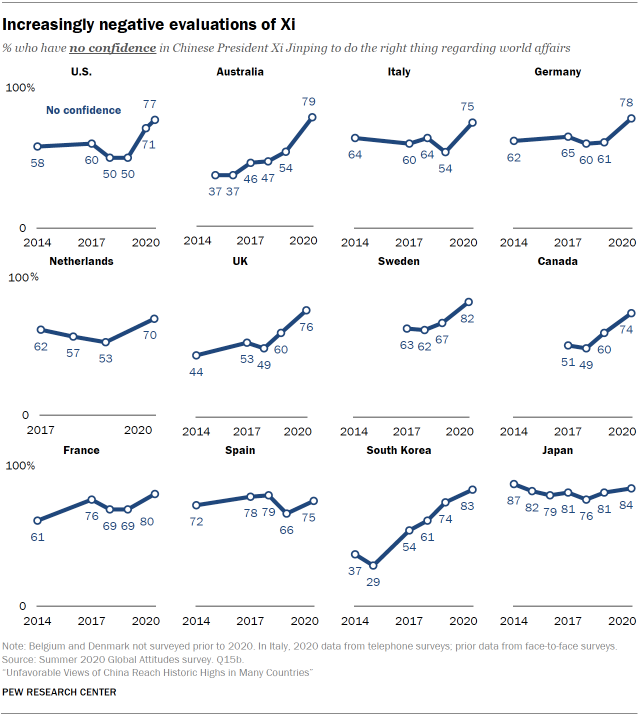Weekly reading 23: a few things about China
Oct 18, 2020- China
- DC/EP
- Glassdoor
Somehow nearly all comments are around topics about China, so I name accordingly. As usual this post was cross-post at substack too. Go there for fancy and easier email subscription.
科技爱好者周刊(第 127 期):未来人人开发软件,几乎没人编码 - ruanyifeng:
现在,少儿编程培训班很流行,一到周末,家长们就送孩子去学计算机。
我想起小学偷偷去网吧打游戏,原来那个时候我已经这么自觉和超前,根本不需要家长送,自己每天放学就去学习,甚至学到忘我直到家长来把我逮回去。
Such computer programming class for kids is getting strong attention among young parents in China. Apparently, 9 year-old is considered an age too late to start the class - kids usually are enrolled at age of as early as 6. Dating back to when we were kids, there weren’t anything like this. Instead there was internet cafe, and we went there for gaming, like this:

That was a time when internet connection and computers are still expensive and not every family could afford them. I wouldn’t trade gaming for class for sure.
National Day; Pew research on views toward China and Xi; Wang Qishan; Taiwan - sinocism:
This is from a Pew research of views of China from different countries. I like how remarkably consistent Japan has been over time. 你当然找不到任何中国官方媒体报道这个研究。
红包来了!数字人民币比微信支付宝好用吗? - xinhuanet:
近日,深圳开展数字人民币红包试点,面向在深个人发放1000万元数字人民币红包,每个红包金额为200元,红包数量共计5万个。最终,191万多人报名摇号,抽出了5万人,中签率仅为2.6%,人们对数字人民币的热情可见一斑。 […] 据悉,深圳本次试点是深圳市在疫情防控常态化期间,为刺激消费、拉动内需开展的创新实践,也是数字人民币研发过程中的一次常规性测试。
数字人民币是中国人民银行发行的数字形式的法定货币,将主要应用于流通中现金,由指定运营机构参与运营并向公众兑换,与纸钞和硬币等价。
想象一下,你的每一笔消费都变成一条数字记录,存在政府和银行的数据库里。不仅如此,这笔消费所用的钱的来源也存在那里,一直可以追溯到最初这笔钱发行之时。而且你没有选择,只能用数字人民币,因为商家不再接受现金和其他数字支付比如微信支付宝。这个数据库将是有史以来最大规模的个人监视系统。跟他比,天网之类的人脸识别系统真是土掉渣。就算你能一辈子戴面具或者足不出户,不与其他人进行任何交易无异于跟现代社会完全隔离。
Coronavirus: China punishes two health officials over hospital cluster - scmp:
Two officials in the eastern Chinese port city of Qingdao have been punished after a cluster of 12 coronavirus cases was found in a hospital, triggering the city to test all its 10 million residents.
I’d imagine people in western countries would protest and fight for freedom if a local government says everybody in this city needs to be tested. All political and ethical debates aside, there is something in the way how eastern countries handle the virus outbreak that western countries would take generations to learn eventually.
任何事情一旦与官位联系起来,就会受到政府官员最高度重视。反过来看,任何事情只要没和官位联系起来,就没人会重视。最直接的例子就是新年前后新冠刚刚在武汉爆发的时候,在已经有技术人员提出警告的时候,根本没人去理会或者做任何动作。这种机制下,普通民众是真的看官老爷脸色吃饭,跟五千年来历代王朝并无二致。
A warning for Taiwan; Xinjiang; NBA’s China troubles may be over soon - sinocism:
As part of the campaign this week to expose alleged Taiwan spies, the Thursday People’s Daily carried a harsh commentary on page 7 - “On the right side of history-Letter to Taiwan Intelligence and Security Agencies 站在历史正确的一边——告台湾情治部门书 - 安 平”.
[…]
The commentary included a rarely used in the People’s Daily phrase that means “don’t say I didn’t warn you 勿谓言之不预也” (wu4 wei4 yan2 zhi1 bu4 yu4 ye3) The specific wording was used in editorials (社论) by the paper in 1962 before China went to war with India and before China invaded Vietnam in 1979, as well as a few dozen times over the decades in other pieces that were not editorials (社论).
It was used last year in a commentary by 五月荷 during the height of the US-China trade war, as discussed in the May 29, 2019 Sinocism. It now seems to be a bit devalued in terms of potentially signaling imminent conflict, especially if it appears in something that is not a People’s Daily editorial 社论, the most authoritative editorial statement the People’s Daily makes.
The original post is harsh and serous as usual, and many new media compare it with other 2 times when the phrase was used right before China wedges a war, claiming this is a dangerous signal. Personally I tend to agree with Sinocism more as this is more of a warning than a signal. Especially around such turbulent time there’s nothing to gain to start a war, not to mention US election is around the corner. We can maybe look back again a few months later, and hope we were right at this time.
A Warning About Glassdoor - mjtsai:
I have a very close family member that works for Glassdoor. I spoke to this person and found out that a strategic repositioning, if you will, for Glassdoor is that they are trying to become a PR company of sorts, so they are focusing on brand management for companies. As a result, they are getting very aggressive with negative review-takedowns while allowing very obviously fraudulent positive reviews to remain the same.
I think Glassdoor used to rely on on-site ads of job openings for revenue, which apparently didn’t work out. This business model not only commoditizes itself, since there many competitors offering the same service (monster, indeed, hired, etc), it doesn’t leverage its only advantage either, which is the organic review data. LinkedIn, on the other hand, was able to leverage its biggest strength, the professional network, by providing exclusive access through membership, which is attractive to both not only job seekers, but also recruiters, and basically whoever are into professional connections (which is a lot).
The repositioning means Glassdoor finally is look at its own strength, unfortunately in an unsustainable way. The business model is the same as that of Yelp, but not only the market is smaller (employer vs shop owner), but also is much less critical to its clients - Yelp reviews are one of the few ways people use to determine the eligibility of a shop, especially small ones, but employers usually own a PR/HR team, and have established channels to do PR and promote themselves (blog, recruiting event, etc).
Other reads
- ‘This is a guy who is a thug’: how US elite became hawks on Xi’s China - ft
- Xi again calls for self-reliance 自力更生; Xi inspects Marine Corps; Decent economic data - sinocism
- Xi goes South; Shenzhen 40th anniversary; Taiwan spies; Korean War; Qingdao outbreak; Central Committee regulations - sinocism
- Gymshark’s new customer acquisition is devouring the competition - secondmeasure
- Apple fibs about iPhone 12 pricing to promote wireless carriers - sixcolors
- Grocery spending reveals where New York and California residents may be migrating - secondmeasure
- Spotify spikes SongShift - sixcolors
- Quick thoughts on Apple’s October event - sixcolors
- The Era of Visual Studio Code - robenkleene
- Build Personal Moats - substack
- Xi’s Shenzhen speech; Canada-China relations; US warns about CCP influence in education; Huawei - sinocism

